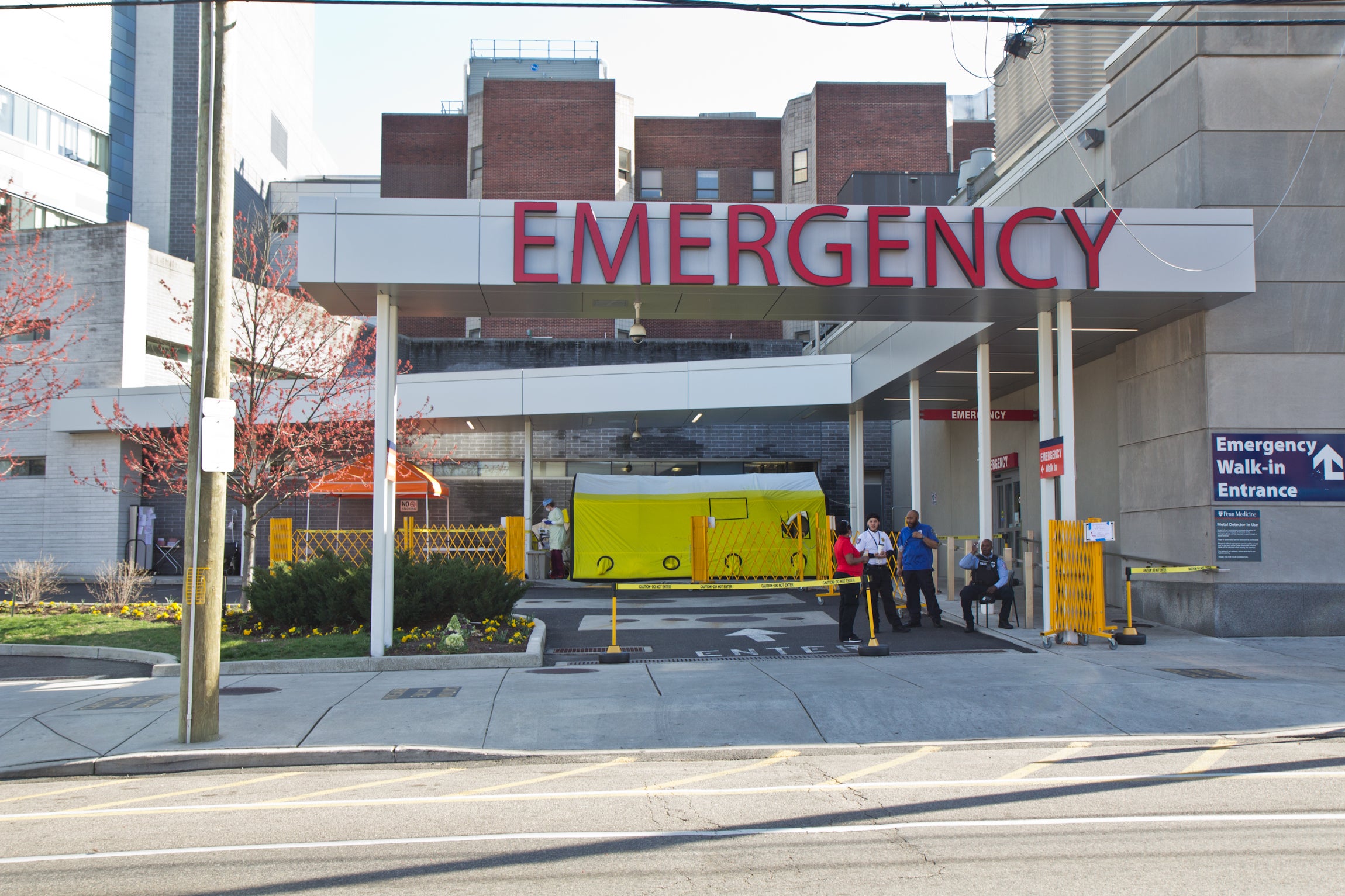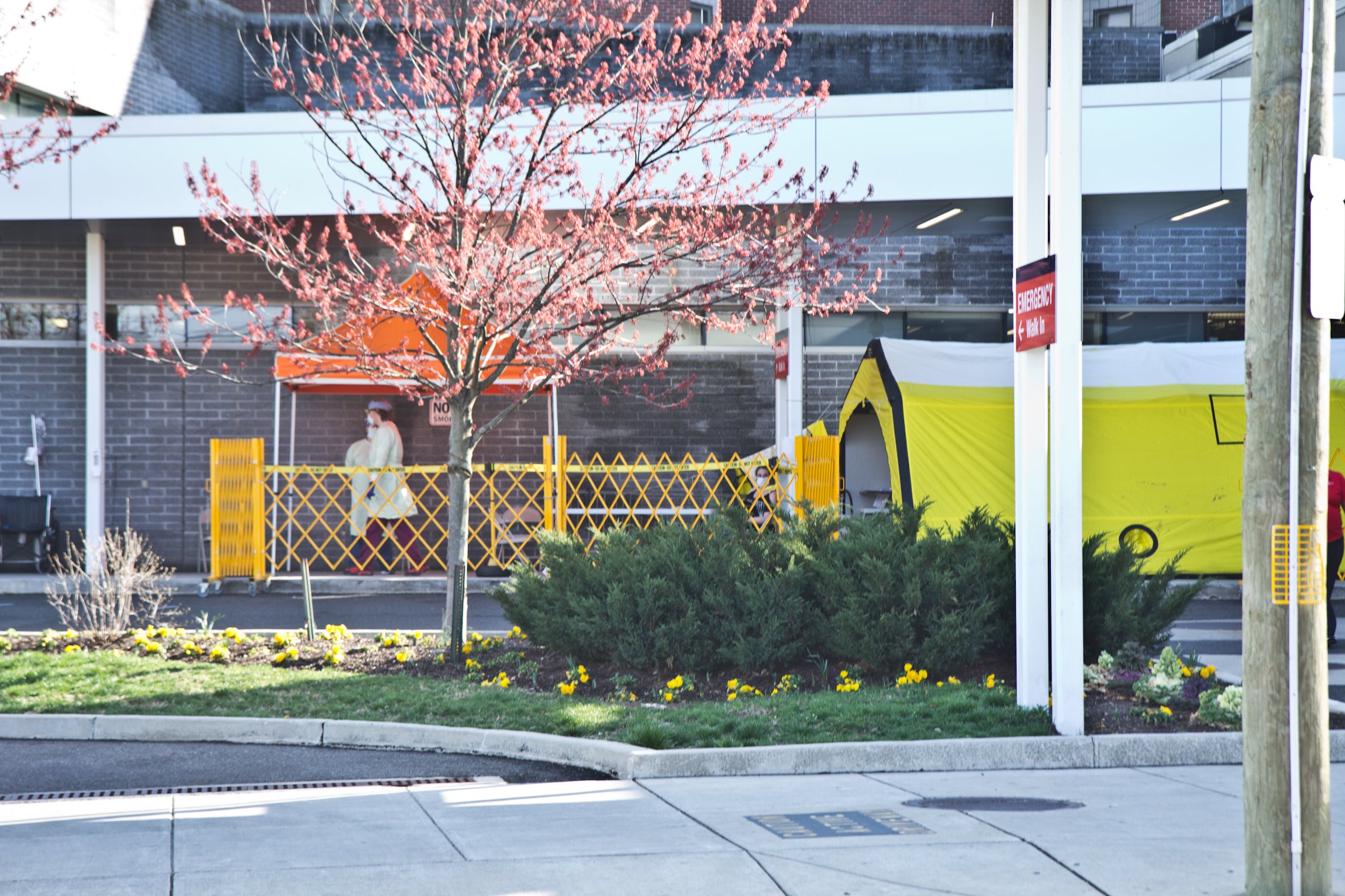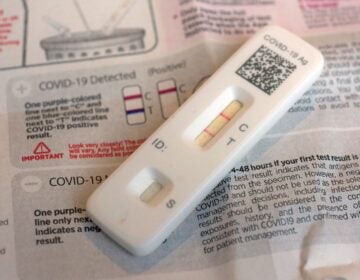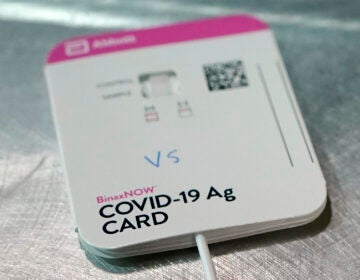‘The calm before the storm’: Emergency departments brace for patient surge
Local health systems are rushing to stock supplies, clear patients out of emergency rooms to make room for patients with severe COVID-19 symptoms.

Penn Presbyterian Hospital in Philadelphia. (Kimberly Paynter/WHYY)
Right now, emergency departments across Philadelphia are quiet. They’re seeing small but steady numbers of people coming in with COVID-19 symptoms, but clinicians there can handle it. That’s because hospitals are rushing to clear patients out and free up space for what is predicted to be an onslaught of people with severe symptoms, seeking critical care.
“This is really the calm before the storm,” said Ben Sun, chair of emergency medicine at the University of Pennsylvania. “We are doing everything humanly possible to prepare [for] what’s coming in the next one to two weeks.”
Over the course of the past seven days, Sun said, emergency departments across the University of Pennsylvania Health System have completely transformed their way of approaching possible COVID-19 patients. At first, they were screening people by asking questions about high-risk travel. But now that there is evidence of community spread, there is little hope left for containing the coronavirus.
So Penn hospitals are in the process of setting up tents outside their emergency rooms to evaluate and test patients with mild symptoms of the virus, and send them home before they ever make it inside. That way, there will be more room in the hospital for patients with more severe cases.
“We simply don’t have the capacity to admit patients with mild symptoms,” said Sun. He added that the treatment for a mild case of COVID-19 is the same whether the patient has a diagnosis: drink lots of water, get lots of rest, take Tylenol to manage a fever. The only thing going to the hospital does is risk infecting other people.
“If you’re somebody who has coronavirus with mild flu-like symptoms, the last place you want to be is in the hospital,” he said.
Projections suggest that the number of severe cases will outpace the number of intensive care beds available in Philadelphia and throughout the country.
One such tent is already up and running at Penn Presbyterian Hospital in West Philly. Sun said he hoped to have another one ready to go by the end of the weekend at the Hospital of the University of Pennsylvania, and next week at emergency departments in Lancaster, Chester County, and Princeton.

In tandem with the tents, Sun said Penn’s hospitals are repurposing operating rooms for critical care, and have been able to empty several hundred beds in preparation for the coming need. He said the cancellation of many elective surgeries has freed up hospital space to reduce crowding or “boarding” in the emergency department. Right now, things are relatively slow.
Einstein has a similar plan in place for outdoor tent triage when demand calls for it, but hasn’t activated it yet. There, the main strategy so far has been immediately separating those who come in with COVID-19 symptoms from the rest of the emergency department.
A nurse stands at the door and does a quick evaluation. If the person has been exposed to the virus or is experiencing symptoms, he or she is given a mask and directed toward an isolated part of the unit. From there, those patients are evaluated to determine if they require testing, can be sent home, or need to be hospitalized.

Jefferson Health has been diverting patients away from its hospitals’ emergency departments by using telemedicine.
Jefferson’s telehealth volume has increased fourfold since the crisis went into overdrive about 12 days ago, according to Aditi Joshi, an emergency doctor and medical director of the acute care division of JeffConnect, Jefferson’s telemedicine service.
Joshi said the telemedicine team has seen an uptick in patients who might have otherwise just showed up at the ER or urgent care with questions about a cold or a rash, or for medication refills. But doctors are also taking calls from lots of people with the symptoms characteristic of COVID-19: a dry cough, shortness of breath, and fever.
One day last week, she said, out of the roughly 200 patients who called in, 40% were ordered tests. Most of those orders are sent to Jefferson’s drive-through test sites in Abington or Center City, which also offers a walk-up option.
Many insurance providers have expanded their plans to cover telemedicine appointments, and without insurance, the visits are $49. Those seeking consultations do not need to be established Jefferson Health patients to set up appointments.
Joshi said she thinks of her unit as being like the Nightwatch in the HBO series “Game of Thrones,” whose job it is to defend the kingdom’s perimeter against the external threat of White Walkers while those within prepare for war by emptying out the ER and stocking up on any personal protective equipment and ventilators they can get their hands on.
“Right now, we’re holding it up, we’re trying to keep people at home,” said Joshi, who said ER volumes in the past three weeks have been down to the levels they were before Hahnemann University Hospital closed. “Maybe it’ll help so it doesn’t come crashing down but it comes down in small pieces, so we have a little bit of ability to prepare and be ready for it.”
Her colleagues from internal medicine, family practice, liver and anesthesia are all volunteering to do screening calls, Joshi said. The telemedicine doctors can rotate in when ER clinicians are inevitably exposed to the virus and need to be quarantined, she said.
“They can still do telemedicine calls, they can still take care of patients, and that can allow the rest of us who are not quarantined to work in the emergency department,” she said, describing a sort of changing of the guard.
The shortage of personal protective equipment (PPE), such as masks, gowns, gloves and goggles, and powered air-purifying respirators (PAPR) used for severe cases has clinicians very worried.
Sun said Penn is exploring the option of manufacturing its own PPE in its engineering department, or sourcing some from its research labs, which have scaled down substantially. In the meantime, they are trying to minimize the number of healthcare workers that interact with patients to reduce the amount of PPE used on a given shift. They’re also reusing PPE between patients, which the Centers for Disease Control and Prevention recommends only in times of crisis.
Ryan Overberger, an emergency doctor and co-chair of Einstein’s emergency management committee said his department is also walking the delicate line of maintaining PPE supplies and safety for its health care workers. He said while they have enough equipment right now, emergency clinicians are nervous.
“Even with maximizing PPE, just like a firefighter, there’s always a risk,” he said.
So far, 16 of the 85 confirmed cases in Philadelphia are known to be health care workers. That group is considered among the highest risk, and is the priority for testing at the city’s test site.
Clinicians at all the hospitals stressed that the best way to support the health care workers at the front lines of the crisis is to abide by the social distancing directives issued by state and local governments.
“We’re talking about your family members, your friends, the most vulnerable in our society are going to be the ones at the highest risk of dying,” said Sun. “This is a generation-defining event, and people need to take it that seriously.”
WHYY is your source for fact-based, in-depth journalism and information. As a nonprofit organization, we rely on financial support from readers like you. Please give today.


![CoronavirusPandemic_1024x512[1]](https://whyy.org/wp-content/uploads/2020/03/CoronavirusPandemic_1024x5121-300x150.jpg)



